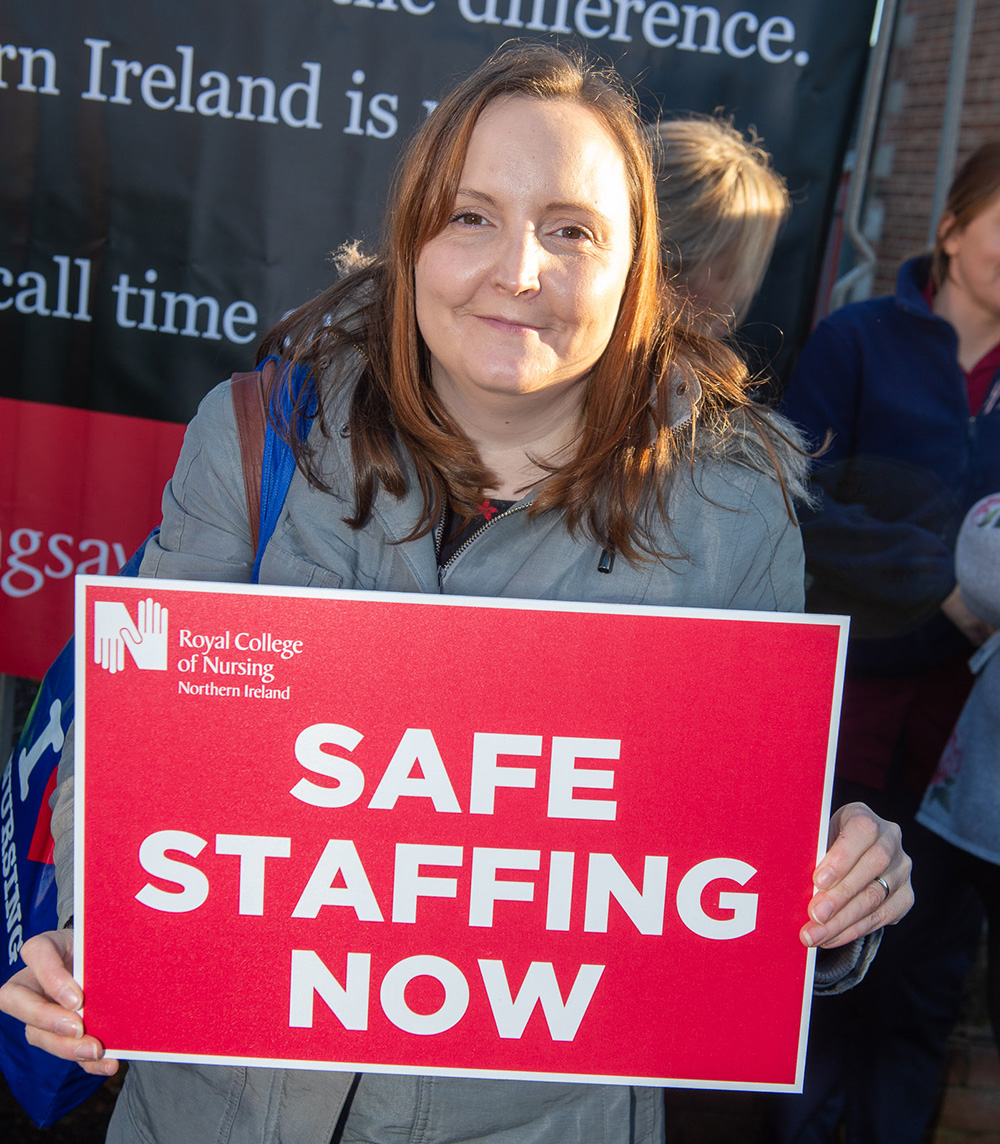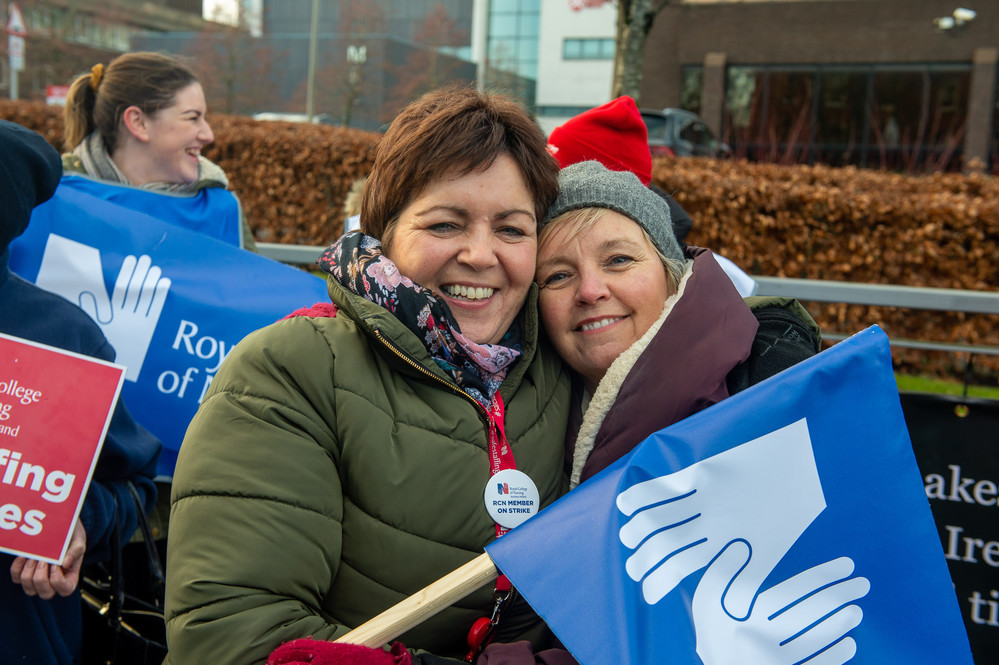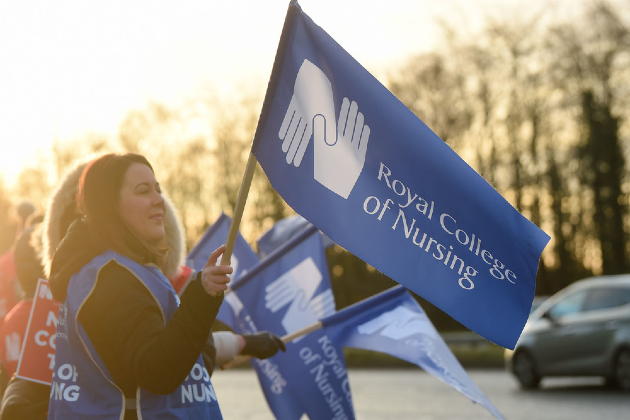“The night before strike action, I was so stressed I couldn’t sleep,” says Edel Coulter, an RCN rep and staff nurse at Belfast City Hospital involved in the strikes that started in late 2019.
“I tweeted about feeling worried and a former patient’s father replied saying he’d join us on the picket line. I was in tears. I thought ‘if this man is willing to join us on strike at the hospital where his daughter died, then we’re doing the right thing’.”
Two years ago, for the first time in the 103-year history of the RCN, nursing staff went on strike in Northern Ireland to fight for safe staffing and fair pay.
“It was daunting, I was really anxious about something going wrong and patient safety,” says Edel. But that was the point, she explains, patients were already at risk due to short staffing. “We were doing this for our patients,” she says.
Once on the picket line, her fears were allayed, and she felt very different. “The support was unbelievable. People stopped to thank us for our work, they beeped their horns, delivered us tea and pizzas. Retired nurses and politicians came down too. The support was incredible,” she says.

Following the strike action, Edel has a bigger sense of self-worth. “It built our confidence actually,” she says. “It created this sense of community among nursing staff and gave us faith in our ability to challenge leadership, more than we’d ever done before. Previously, we would’ve just accepted things for what they were, but now we speak up.”
What we achieved
Rita Devlin, now Director of RCN Northern Ireland was heavily involved in organising the strike action. She says there were several things it sought to achieve, including increasing the number of student nurses in training and a return to the post-registration nursing education budget.
"We also wanted full funding and implementation of the Northern Ireland safe staffing framework, and for this to be set in legislation, as well as pay parity with the NHS in England, and measures to improve safe staffing."
We have achieved a lot and we’re working on achieving more
The increase in the number of student nurses in training was achieved, as was pay parity and the return to the post-registration nursing education budget. The safe staffing framework is still being worked on. “Safe staffing is a life’s work,” Rita says. “It was never going to happen overnight.” However, she explains that they did get an agreement from the health minister Robin Swann that work would begin on this.
“We also asked for implementation of the Nursing and Midwifery Task Group Report, which contained recommendations to improve recruitment, retention and career pathways,” says Rita. “COVID-19 has impacted delivery, but we are working on this now.”
For nursing staff on the ground, it may feel like not that much has changed. “I want to tell them that we have achieved a lot and we’re working on achieving more,” says Rita. “The RCN is sitting at all the tables where the discussions are taking place and there is a lot happening behind the scenes.”

Edel also thinks that nursing staff are now much more vocal and likely to flag things they don’t think are right. “I think that’s a really good thing,” she says.
Where are we now?
Fast forward to 2022, and the RCN in Northern Ireland has run a consultative ballot of its eligible members on the 3% pay award for Health and Social Care (HSC) staff on Agenda for Change terms and conditions. The ballot, which closed on 10 February 2022, asked eligible members whether they consider the pay award to be acceptable or unacceptable.
The ballot saw a 51.75% turnout, with 92.2% of those saying they think the pay award is unacceptable. The RCN Northern Ireland Board will now carefully consider the results, decide on next steps, and let members know when further decisions have been reached.
Challenges in the workplace
“Nurses are feeling completely demoralised at the moment, because everyone has gone above and beyond throughout the pandemic. One minute we’re being called heroes, and the next minute we’re being given a pay rise which doesn’t even match inflation,” says Edel.
“That was a real slap in the face to be honest. If we're not respected now, then when will we ever be respected?”
Edel says the health care service is also having big issues with retaining staff, with many people leaving for personal reasons exacerbated by the pandemic, and others retiring.
If we don't invest in nursing staff then we don't have a health care service
The pandemic has shifted things into a completely different gear. “It’s causing so much stress for people in their working lives and personal lives too. People fear bringing COVID home or getting long COVID.
“To be honest, during the first year of the pandemic, I found it very difficult to sleep. I would be worrying all the time about my friends, family and colleagues. And what if I made a patient unwell?”
Edel believes the solution to some of these problems is investing in the nursing workforce. “It’s not rocket science, we just need to look at how we’re going to recruit and retain nursing staff. We need to have enough student nursing places and consider how many staff will be retiring soon."
Offering greater flexibility is a way to retain staff, says Edel. “Basic flexible working offerings, such as more part-time work, can help retain staff. Just because nursing staff are used to working long hours, it doesn’t mean it’s the right thing,” she says. “It's not the kind of job where you want to be tired because you’re making important decisions about patient care. You want to be feeling fresh.”
Future strike action?
Two years on, do Rita and Edel think strike action could still be a possibility? “It’s always an option,” says Rita. “But’s it’s not something we’d ever do lightly.”
Edel agrees and concludes with a stark reminder: “If we don't invest in nursing staff, then we don't have a health care service.”








